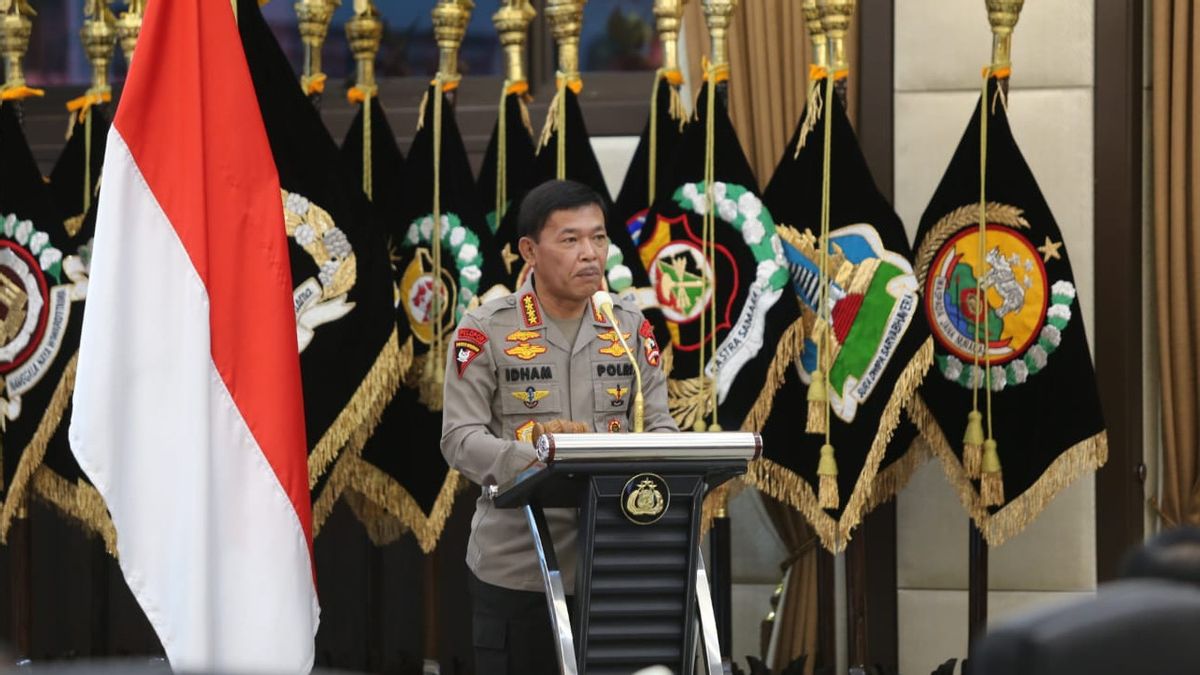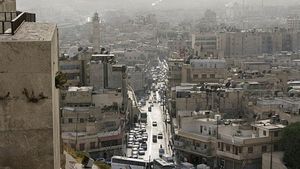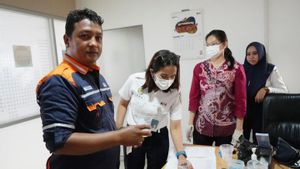JAKARTA - The Indonesia Corruption Watch (ICW) mentions a number of things that must be paid attention to and fixed by the replacement of the National Police Chief, General Idham Azis, who will enter retirement in February.
Through his written statement, ICW researcher Kurnia Ramadhana said, there are two important things that must be a concern for future candidates to replace Idham, such as the agenda for internal reform and the agenda for prosecuting corruption cases in the future can run optimally. This is important because so far the Bhayangkara Corps has often received negative perceptions from the public.
"The National Police has been perceived negatively by the public, especially with regard to its commitment to eradicating corruption," said Kurnia in his statement quoted on Monday, January 11.
Furthermore, he conveyed various highlights to be homework for the next National Police chief candidate. Including the matter of integrity of police personnel because a number of corruption cases actually involve police officers who are supposed to be law enforcers.
He explained that at least nine police generals had been caught in major corruption cases in Indonesia. Among them were Inspector General Napoleon Bonaparte and Brigadier General Prasetijo Utomo, who stumbled over the alleged acceptance of bribes given by Djoko Tjandra while still at large.
To improve this integrity, there are a number of things that must be done. One of them is requiring staff to report assets (LHKPN) to the KPK on a regular basis.
Because based on the data they have, in mid-2019, of the 29,526 Polri members who are obliged to report, 12,779 of them did not.
"The LHKPN reporting is important because with the compliance of members of the police, the Chief of Police can also monitor if there is a non-linear increase in assets," he said.
The next thing that a candidate for the National Police Chief can do is prioritize the internal reform agenda by forming a task force to prosecute corrupt individuals. This task force, said Kurnia, could be a step to answer public doubts when the police investigate corruption cases involving their own colleagues.
Coordination between law enforcersThe next problem that a candidate for the National Police Chief must face is coordination between law enforcement agencies. Kurnia said, this is actually a classic problem because of the sectoral ego in each law enforcement institution and this has been demonstrated several times by the Bhayangkara Corps when they investigate cases involving high-ranking police officers.
"It is known, (currently, red) two high-ranking police officers, Prasetijo Utomo and Napoleon Bonaparte, are being prosecuted by the police for being involved in issuing travel documents, free COVID-19 letters, and removing red notices for Joko Tjandra. request the KPK, the police are not responsive in fulfilling the requests (supervision, red) of the KPK, "he said.
So, reflecting on this incident, the candidate for the National Police Chief to replace Idham must take the initiative to issue a regulation requiring that the case title must be attended by other parties in order to improve the coordination function.
"However, other indicators can be determined for efficiency, for example: a minimum loss of Rp1 billion to the state and involving state actors and law enforcement officials. This point is important," said Kurnia.
Lack of transparency of casesQuoting the Central Information Commission (KIP), ICW said the police had minimal data transparency issues. KIP noted that the police fell into the quite informative category with a score of 70.52.
However, said Kurnia, this assessment should be an evaluation, including for the future Chief of Police. Moreover, it is difficult for the public to access the progress in handling cases currently being resolved by the Bhayangkara Corps.
"This situation creates potential for abuse of authority, especially if it is not followed by clear and strict internal supervision," he said.
Blurred indicators of promotion and the number of police holding public positions
Kurnia said that so far, many police officers have had problems with their track records but have secured strategic positions. This is then considered to be one of the ongoing problems in police institutional reform.
"One of the incomplete problems in police institutional reform is the unclear assessment of indicators for promotion of positions within the Police," he said.
According to him, in the future there must be strict supervision and policies from the elected Chief of Police. So that the promotion process can uphold the values of integrity, professionalism, participatory, accountable, and independent.
In addition, the increasing number of police occupying positions in public institutions is seen as strengthening the dual function of the Police. At least, based on data held by KontraS, ICW said there were 30 police officers who held positions outside the institution from June to May 2020.
"This should be of concern to the elected Chief of Police, because the practice is against Article 28 Paragraph 3 of the Police Law. The regulation states that police officers can hold positions outside the police after resigning or retiring from service," he said.
"So whoever is a member of the police who wants to hold public office, he must resign if he is elected," added this anti-corruption activist.
Decreased enforcement of corruption casesBased on the records held by ICW, Kurnia said that the handling of corruption in the Bhayangkara Corps has always decreased every year.
Throughout 2019, for example, the police only worked on 100 cases with 209 suspects. This achievement decreased from the previous year, namely 162 cases with 337 suspects.
So that in the future, there needs to be concrete steps from the police and there needs to be a firm push from the elected Police Chief to further improve the performance of his subordinates in solving corruption cases.
"There must be concrete steps from the police. For example, by improving the quality of human resources of the Police investigators. So that later the orientation of the assessment will not only be based on the quantity of cases but also on the quality aspect itself," he said.
Potential for misuse of functionThe last problem is regarding the misuse of function. Kurnia said, the current police function seems to be being used by the executive power and implementing counter-narrative against public criticism.
This, said Kurnia, was seen when the government and the DPR passed the Omnibus Law on the Job Creation Act. "The narrative above can be sampled when the National Police Chief General Idham Azis issued a secret telegram letter containing 12 points in response to a demonstration against the rejection of the Omnibus Law on Job Creation," he said.
"In a democracy like this, police actions are not justified. Do not let law enforcement institutions be used by the branches of power to support policies, especially those that are not related to public security," he added.
It is known, the Chairman of the National Police Commission (Kompolnas) as well as the Coordinating Minister for Political, Legal and Security Affairs (Menko Polhukam) Mahfud MD explained the names of the five Commissioners General (Komjen) who were recommended to serve as Kapolri. Those who are considered the most eligible.
"These are the five Komjen that were proposed to the President by Kompolnas to be selected as candidates for the National Police Chief. Gatot Edy Pramono, Boy Rafli Amar, Listyo Sigit Prabowo, Arief Sulistyanto, Agus Andrianto," Mahfud was quoted as saying on his Twitter account, Friday, January 8.
These five three-star generals are considered the most suitable to serve as the National Police Chief. This is because they have a good track record and prescription at the Police.
"The five people are deemed to have met the requirements of professionalism, loyalty and flight hours," he said.
General Idham Aziz has served as National Police Chief after being inaugurated by President Joko Widodo on November 1, 2019. He will retire in February 2021 after becoming the number one person of the National Police for approximately one year and two months replacing Tito Karnavian who was appointed Minister of Home Affairs (Mendagri).
The English, Chinese, Japanese, Arabic, and French versions are automatically generated by the AI. So there may still be inaccuracies in translating, please always see Indonesian as our main language. (system supported by DigitalSiber.id)













